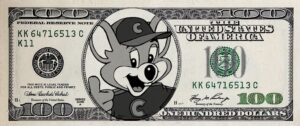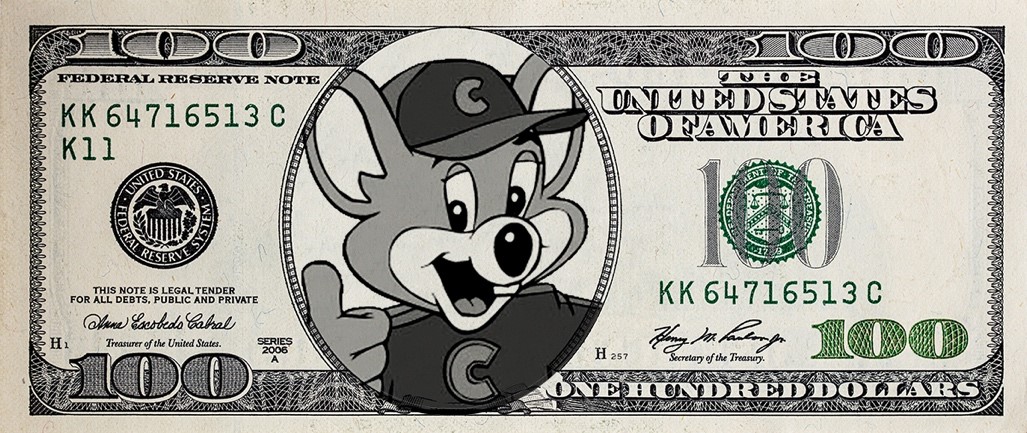A Lesson in Modern Economics… From Chuck E. Cheese

Did you hear the news?
It’s bad.
Chuck E. Cheese has gone bankrupt.
It turns out it’s tough to convince busloads of families to have some fun eating lousy pizza at an arcade in the midst of a pandemic.
But this tale has an interesting and useful twist.
You see, with $1 billion in debt and no hope in sight, the restaurant chain with a mouse for a logo (we heard management will soon start a hotel business with a bedbug as its mascot) was forced toss up its arms and push aside its debt.
But before the company can clean up its books, it has to get rid of an odd liability.
It has more than 7 billion prize tickets in its warehouse.
With a face value of $0.0013 each… that’s a lot of, um, cheese.
New Money
It’s a lesson in modern economics. It’s why we demand the next roundtable meeting of the Federal Reserve be held right between the ball pit and the Skee-Ball machines.
You see, those 7 billion prize tickets are worth a lot of junk. If they were cashed in, they’d be worth some $9 million in prize merchandise… far more than the company can afford these days.
That’s why the rat’s lawyers went to court last week. They asked a judge in Texas whether the tickets – which haven’t been paid for yet – could be destroyed.
“Prize tickets are redeemable by guests at significantly higher value than the cost of prize tickets,” they wrote in plea for relief.
The fix sounds simple. Trash ’em.
Nothing is ever so simple in the world of money… and its fake equivalent.
Those tickets fill the equivalent of 65 cargo containers. They can’t just be sat out on the curb.
And three companies still need to be paid.
The bankrupt mouse will have to pay out more than $2 million just to get out of this trap.
But here’s the rub… It’s why we’re writing you about this news of the odd. Chuck E. Cheese isn’t closing its doors.
If it were, those tickets would not be an issue.
Instead, the company is simply going ticketless.
Its prizes will now be paid out using an all-electronic paperless system.
Welcome to the Future
So why would a bankrupt company pay more than $2 million to get rid of a product that’s still perfectly good and perfectly usable? It will, after all, continue to honor the tickets that remain on the street.
This is where it pays to think a bit differently… to understand there’s always more to the story.
A whole lot more.
You see, Mr. Cheese ain’t dumb. He knows a thing or two about how the human brain works.
He’s read the many studies that show when we have something physical in our hands, humans give it much more value than if that thing existed merely electronically.
In fact, a recent study published by the Journal of Consumer Research showed that we put much more value into something we paid for with physical cash than we do the same product paid for with an entirely electronic transaction.
Proving the point another way, a group of researchers recently tracked a diner as it changed its “frequent buyer” program. Instead of punching a hole in a card each time a customer bought a cup of coffee, the new system tracked things electronically.
As we would think, retention went down and customers put less value in the new digital system.
Now… think about what this means as our economy quickly goes cashless.
More Spending… Less Saving
Think about just why so many companies were oh so eager to take advantage of a “coin shortage” during the height of the pandemic slowdown.
And think about how sticking with cash can give you an “unfair” psychological advantage when it comes to saving and spending.
The government… our banks… our stores… They all want us to go digital.
It means we spend more and they can track more.
But we should want nothing to do with it. It makes us spend what we don’t have. It gives others control of our money. And it makes it a whole lot easier to erase liabilities when things go bankrupt.

The rat with the pizza learned a valuable lesson. Paper money is expensive and puts control in the wrong hands.
We should print his mug on the hundred-dollar bill.
He’s in front of a trend that’s not going away.
The dollar bills in your wallet will someday go extinct. We just hope they’re worth more than the cost to toss them in the trash when they do.
Fight the trend. Stick with cash.






